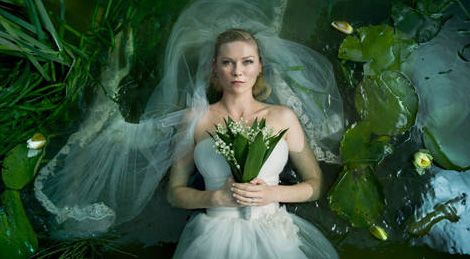After the controversial Antichrist – a critically polarising tale of grief, female circumcision and talking foxes – Lars von Trier, the bad boy of Euro art cinema, has made his most polite film yet.
Indeed, so civilised is Melancholia that one of its most dramatic moments is when wedding guest Stellan Skarsgård hurls his soup bowl at the floor in anger… then swiftly apologises.
The film begins with a beautiful overture, set to Wagner’s Tristan und Isolde, of elegantly apocalyptic tableaux – Kirsten Dunst with birds and butterflies fluttering to the ground around her; Charlotte Gainsbourg sinking inexorably into a perfect golf green.
When we cut to planets speeding balletically through space, you wonder if von Trier hasn’t taken heed of Malick’s The Tree Of Life – except here the cosmic concerns prove more interesting than the human ones.
Melancholia, it transpires, is a huge blue planet threatening to destroy Earth. Frankly, it can’t come soon enough for depressive Justine (Dunst, named Best Actress at Cannes), another of von Trier’s pinioned women of will.
She’s putting on a brave(-ish) face for her opulent wedding, organised by her sister Claire (Gainsbourg) and her rich husband (Kiefer Sutherland), to a man (Alexander Skarsgård) Justine doesn’t even seem to notice. You don’t need to be well-versed in the world according to Lars not to expect a happily ever after.
The beautifully shot banquet is full of scratchy family tensions and acidic asides as sparks fly between the girls’ mum (Charlotte Rampling) and drunk dad (John Hurt).
Although it looks like personal implosions are looming, mostly we just get images of order versus chaos that symbolise the contrast between Justine’s calm facade and internal torment (reckless sex on a manicured lawn; geometric art vs passionate romanticism; a wedding dress on a filthy stable floor).
By the second half, focusing on Claire’s preparations for Melancholia’s arrival, Justine’s catatonic glumness is so all-encompassing it seems to have taken over the whole film – which is surely von Trier’s aim, albeit a rather self-defeating one.
Melancholia may be a polished depiction of not seeing the point anymore, but some viewers will want to shake Justine by the shoulders and say, “Cheer up love, it’s not the end of the world” – even if it is. But then, that would be rude.
Beginning and ending with a bang, but with too much whimpering in between, Melancholia is low-key Lars. But committed turns and poetic visuals will ease you through to The End.

